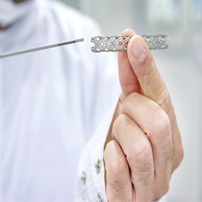 Heart stents have been in use since the early 1980s. The goal of heart stents is to open clogged arteries so that blood can flow and prevent heart attack and stroke. One early and continuing problem with heart stents is that the arteries are smooth flesh while the stents are metal-mesh. These do not merge well and often require another surgery to remove and replace the device.
Heart stents have been in use since the early 1980s. The goal of heart stents is to open clogged arteries so that blood can flow and prevent heart attack and stroke. One early and continuing problem with heart stents is that the arteries are smooth flesh while the stents are metal-mesh. These do not merge well and often require another surgery to remove and replace the device.
Another problem is that the stents do not always prevent clots from recurring. In 2003, several manufacturers including Johnson & Johnson subsidiary Cordis Corporation received a rapid approval from the United States Food and Drug Administration. Within six months, side effects such as clots had resulted in 60 deaths and seriously harmed hundreds.
Later in 2003, the FDA warned about potentially serious complications resulting from the use of drug-coated heart stents, including the Cordis-manufactured Cypher. The Cypher seems to have an increased risk of stent thrombosis, a situation wherein clotting occurs on the surface of the stent. The clots can break away and enter the blood stream causing the very condition they are intended to prevent, namely a heart attack.
Another issue related to the Cyper heart stent is allergic reactions. The stents are produced using gold and nickel, both of which can cause severe reactions in many patients. An allergic reaction in anyone can be life threatening because of the potential for anaphylactic shock; but when someone has a heart stent in place, immediate surgery is needed to avoid death.
Recognizing these issues, Boston Scientific removed their Taxus stents from the market in March 2004. The company immediately issued a recall of more than 100,000 drug-coated stents. Others, such as Johnson & Johnson have not been so forthcoming. In fact, despite the dangers, many manufacturers continue to sell the devices without proper risk warnings.
Many would argue that the risks of heart stents are outweighed by the benefits. Heart disease is the number one killer of men and women in America, taking one life about every 29 seconds. Given those troubling statistics, many conclude that any treatment that can stave off death is worth the risk.
Duke University Medical Center conducted research in 2004. The study team concluded that stents do not increase survival rates of patients. The study included both traditional stents and drug-coated stents. Another study published in 2012 in the Archives of Internal Medicine journal reported on the efforts of top medical scientists from five major medical research centers including Harvard. The study concluded that despite the additional $409 million spent on drug-coated stents over less costly alternatives, no advantage existed.
If you have suffered because of a drug-coated heart stent or have lost a family member because of faulty medical products, you deserve compensation for your losses. The Philadelphia defective medical device lawyers at Brookman, Rosenberg, Brown, & Sandler help victims of drug-coated heart stent failures. From our convenient office location in Center City Philadelphia, we help those harmed by defective medical devices throughout the Delaware Valley, Pennsylvania, and New Jersey. For a confidential consultation, contact us online or call now 215-569-4000 or toll free 800-369-0899.